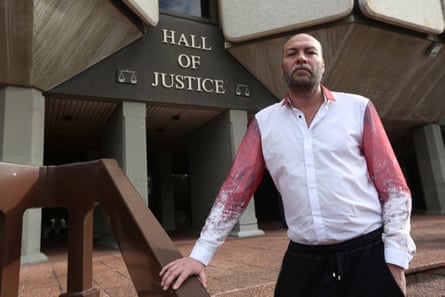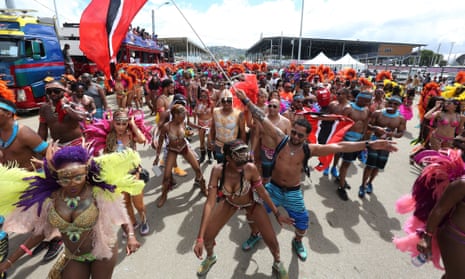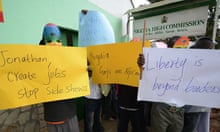Trinidad and Tobago could make legal history in the Caribbean this week by rolling back long-standing homophobic laws.
On Thursday, a high court judge, Devindra Rampersad, will deliver his verdict in a landmark case brought by a private citizen which, if successful, would set a legal precedent for removing similar laws in countries across the region.
In March 2017, Jason Jones, an LGBT activist, took the government of Trinidad and Tobago to court, filing a lawsuit to strike down the so-called “buggery law”, which dates from British rule. Jones argues that section 13 of the island’s Sexual Offences Act, which criminalises anal sex, is unconstitutional because it violates his right to privacy, liberty and freedom of expression.
Trinidad and Tobago’s constitution was written in 1976 when the country became a republic, severing ties with Britain. In 1986, its parliament rewrote the act, doubling the maximum penalty for sodomy between adults to 10 years’ imprisonment. In 2000 it increased the maximum penalty again, to 25 years.
Quick GuideWhat are the laws against homosexuality in the Caribbean?
Show
While rarely enforced, laws against homosexuality still exist in some Caribbean countries.
In Jamaica and Barbados conviction for sodomy carries a maximum penalty of life imprisonment.
In Grenada, St Lucia and St Kitts and Nevis, “unnatural crime” or “abominable buggery” between two men is punishable by up to 10 years in prison, but sex between two women is legal.
Cuba legalised gay sex in 1979, as did the Bahamas in 1991 and the British Virgin Islands in 2001.
In 2016, LGBT activist Caleb Orozco successfully challenged Belize’s buggery law. The case is under appeal by the Catholic Church.
A similar case lodged in Jamaica since 2011 has not passed the preliminary hearing stages because of interventions by religious groups.
Haiti, which gained independence from France in 1804, has never had laws banning same sex acts, but is in the process of passing a law banning gay marriage.
Though rarely enforced, that amendment to the law created a loophole that allowed Jones to bring his action, because it nullifies the “savings clause” written into the constitutions of former British colonies. Savings clauses, introduced to ease transition at the end of the colonial era, decreed that British laws could not be changed after independence. But because the Trinidadian government altered the act so drastically, in effect replacing the pre-independence act of parliament, the law is now open to reform.
Media coverage of Jones’s case has thrown him into the public eye and he has received death threats and abuse. The case has also caused a rift between him and LGBT activists in the country who fear the political consequences and social reprisals.
Despite having more tolerant attitudes than some Caribbean islands, Trinidad and Tobago has no laws protecting LGBT people from discrimination and it is still rare for people to be openly gay. A transgender woman was shot dead last year and gay Trinidadians have recently sought asylum in Britain, having faced persecution, harassment and sexual violence.

Jones, who lives in London and is a dual-nationality British citizen, claims that a serial killer targeting homosexuals murdered five gay men in Trinidad in 2017 but Colin Robinson, from the organisation Coalition Advocating for Inclusion of Sexual Orientation, rejects the claim and does not support Jones’s court case. He says the community should focus on the exclusion of gay and transgender citizens from the country’s Equal Opportunity Act before addressing sexual freedoms.
“Is removing this law a strategy that we support as a movement? No,” says Robinson. “The political cost is relatively high. [The buggery law] enhances the stigma attached to certain types of sexuality,” he concedes. “But I’m not aware of any arrests for consensual sex.”
Jones disputes the lack of arrests and believes decriminalising gay sex is an essential starting point. “How can I begin to demand rights in any other context when I am an unapprehended criminal?” he argues.
Jones is also disappointed by a lack of support from Britain. “The British High Commission in Port of Spain has made no statement about my case at all,” he said. “The British government has not assisted me in any way. Nor has any British NGO. Britain has left LGBT rights off the agenda at the Commonwealth heads of government meeting this month in London.”
The next Commonwealth summit in 2020 is in Malaysia, where homosexuality is punishable by whipping and imprisonment. This year’s is expected to be the last the Queen will attend in person.
“Total cowardice,” says Jones. “This was a real chance to push the issue, especially as the vile laws were bequeathed to us by the Brits. Out of 53 member states, 37 criminalise LGBT people using British colonial era laws. There should never be diplomacy when there are human rights at stake.”
In the run-up to the ruling, religious groups have staged weekly demonstrations in downtown Port of Spain, with rallying cries to “save our country” and uphold traditional family values.
Trinidad and Tobago’s attorney-general, Faris al-Rawi, who is overseeing the government’s case to retain the law, is seen privately as progressive on the issue, but social and political pressure to maintain the law is strong. The case could end up in front of the Privy Council in London, the islands’ final court of appeal.
“Our society has changed significantly in its view on tolerating homosexuality, and radically so within the last generation,” al-Rawi said, after Jones lodged his challenge. “In our evolving democracy, we have the opportunity to move our laws along in tandem with society’s consideration of those laws.”
But in a country that only last year repealed child marriage, the attorney-general admits he has “reservations about society’s preparedness to move away from certain norms inherited from other jurisdictions.”
Jones and his QC, Richard Drabble, meanwhile, are confident. “The important part of my judgment is the effect it will have in the seven other Caribbean nations that have the Privy Council as our highest court of appeal,” Jones says. “My win there would guarantee that there can never be a rollback of decriminalisation as seen in India.”








